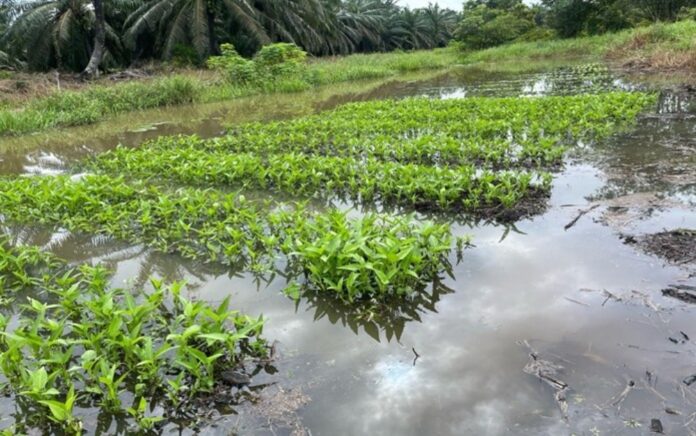MIRI, Feb 22 — The Sarawak Miri Division Planters Association is expressing deep concern over the massive losses suffered brought on by the heavy rains before and during the Lunar New Year.
The association stated that 80 per cent of its planters’ crops were damaged, which had severely impacted their income.
The association’s secretary Chong Teck Shuin said the persisting torrential rain had left the planters here in helplessness and frustration as they could only harvest about 20 per cent of their crops.
“Most farms were flooded during the rainy period and these crops, unfortunately, were left in the pools of the water.
“If the crops remain in stagnant water for too long, the roots will begin to spoil, especially for leafy vegetables which tend to get spoiled very quickly,” he told The Borneo Post.
He said about 80 per cent of the crops were declared total loss and about 80 per cent of its active planters — whose farms are mostly in Kuala Baram, Tukau, Sungai Rait, and Sibuti — were left with little to no income until the next harvest.
He added that there is currently a serious shortage of leafy vegetables as well as gourd and legumes due to the flood, which resulted in shockingly high prices of local vegetables.
These vegetables, he said, are mostly grown locally as they are likely to spoil very quickly to withstand long logistics and transportation processes.
“We had no choice. With the wholesale price of local vegetables now at RM15 per kilogramme, the retail price is ranging between RM20 and RM25.”
The association’s chairman Chin Vui Min said in addition to losing their crops, the planters are also forced to start from scratch, which means dealing a significant setback to their livelihoods.
“Before the floods, planters would routinely fertilise and maintain their farmland to ensure that the soil remains fertile and conducive for planting, which involved long-term careful planning, investments in fertilisers and pesticides, and labour—all are intensive upkeep.
“With the floodwaters destroying everything, all efforts have been washed away, including the water pumps used to mitigate the water flow.
“Now, we must not only replant but also rehabilitate the land, which could take at least a month before we can produce a new batch of crops again,” he said.
While planters can apply for fertilisers as well as the necessary tools and equipment through the Agriculture Department annually, Chin said most of the planters are struggling to cope with the ever-challenging agriculture industry.
“Not every planter’s application gets approved.
“Most planters fall in the B40 (low-income) and M40 (medium-income) groups, so we have to save from the good season to prepare for a more challenging season.
“However, while we have a good harvest, so does everyone else. When the supply exceeds demand, the prices drop and we still end up in the same situation.
“Local planters are currently struggling to even have any vegetables to sell,” he said, adding that the shortage of vegetables could persist until mid-March.
Chin also said the Federation of Vegetable Farmers Associations has launched an aid and is in the midst of collecting information of affected planters to request for pesticides and fertilisers from relevant companies.
“We hope our plight can be highlighted to the relevant authorities and the government to provide aid and materials to restore our agricultural production capacity as soon as possible,” he added. — The Borneo Post


